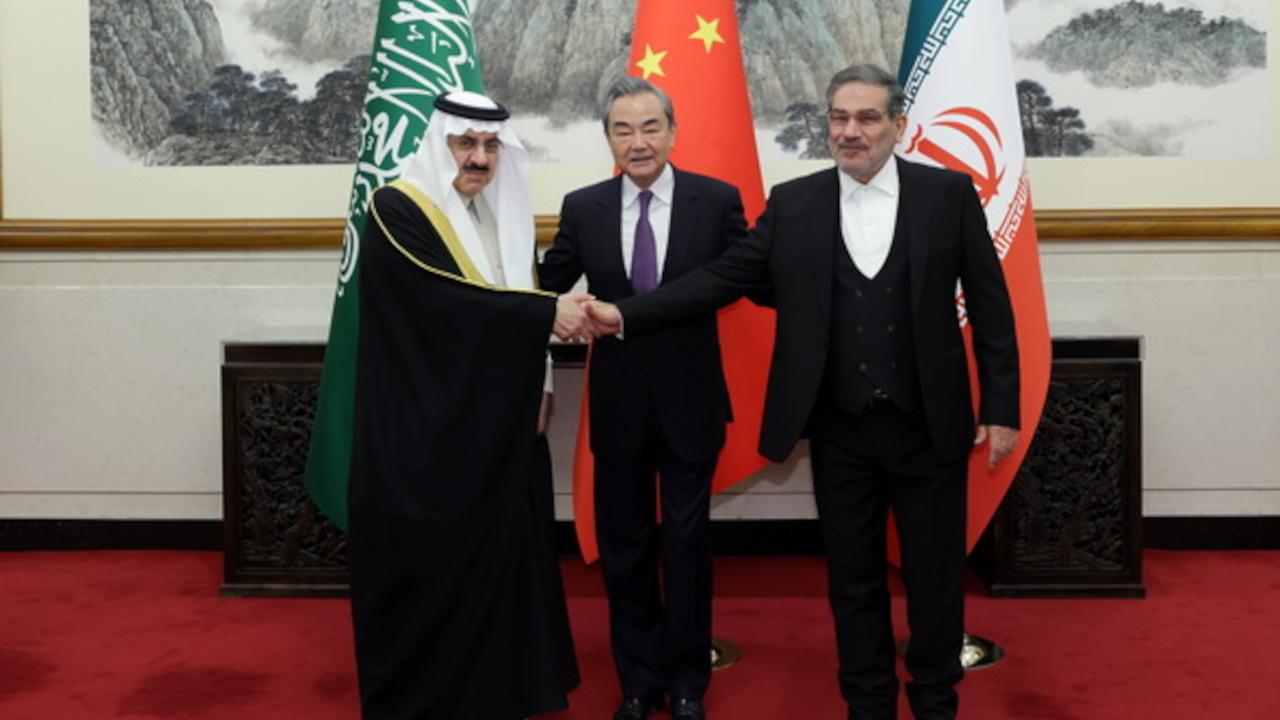Not Good: China Bypasses Biden on Iran, Saudis
The Obama-Biden approach to the region costs us the Arab Coalition.

Minister of State and National Security Advisor Dr. Musaad bin Mohammed Al-Aiban of Saudi Arabia, Director of the Office of the Central Commission for Foreign Affairs Wang Yi of the PRC, and and Secretary of the Supreme National Security Council Admiral Ali Shamkhani of Iran in Beijing, March 2023. Courtesy of the Embassy of the People's Republic of China to the US.
In a surprise move, China has bypassed the Biden administration as a “dealmaker” in the Mideast. The Red Dragon organized discrete messaging cycles between Iran and Saudi Arabia, and sponsored a trilateral public meeting between the three governments, announcing that Riyadh and Tehran have agreed to reestablish their suspended diplomatic relations, mutually reopen embassies in the two capitals, and commit to the equivalent of a “non-aggression pact.”
Some sources in the region went as far as asserting that the “deal” also included that both sides would suspend support to each other’s oppositions. Going even farther, some other sources are asserting that Iran will abandon its militias in the region, while Saudi Arabia will commit to not supporting the revolution in Iran.
However, this last assertion is too far of a stretch. Questions in America are now fusing:
♦ How could this happen?
♦ How would China steal this “diplomatic blitz” from the mouth of the Biden administration?
♦ How did it happen?
Well, there are multiple answers to this series of inquiries especially by the US public, stunned by these global events.
Let’s review the arguments for each player, China, Saudi Arabia and Iran and we will at least get some answers.
China has been profiting immensely from the war in Ukraine. It positioned itself as a third non-belligerent party—while it is supplying Russia with weapons. Without an end in sight, the Biden administration and NATO are bogged down in an endless confrontation in Ukraine.
Biden doesn’t wish to escalate a confrontation with Beijing because of trade, debts, and inability to resolve the conflict in eastern Europe. So Chairman Xi moved in to snatch a “deal” behind Washington’s back and reconnect Saudi and Iran in a peculiar pact, but not yet a full treaty. China cornered the US because the latter cannot say this is a “bad move.”
Washington has to accept a deal it cannot reject, because it is about stabilizing the region and removing the trigger to wars!
Biden was played by Xi.
But the question is then, why would Saudi Arabia strike a deal via China, not via the US, with its archenemy Iran?
Simply because the Biden administration, and before that, the Obama administration had dismissed Riyadh’s concerns about Iranian expansion and support to the Houthis. Saudis told this writer years ago that the Obama-Biden pressures on the Kingdom were enormous, and that eventually the Saudis would have to salvage their national security by any means.
Besides, China is trading big with the Saudis and the Gulf in general, and has also significant trading agreements with Iran.
Beijing convinced both contending foes that it will treat equally between the two.
The Biden team has been rushing to re-sign the Iran Deal, throwing Saudi Arabia, the Gulf, and Israel, all under the bus.
The Saudis are telling Biden “we can cut deals ourselves.”
As for Iran, the grand master of the game, it has only gains to make from this development. They are saving the regime’s skin from a critical danger coming from both the inside and outside. The growing Iranian revolution led by women and minorities has cornered the ayatollahs, whose real fear is to see regional and international parties extend support to the protests, and maybe to a potential government in exile.
By signing a non-aggression pact with the Saudis, they would be obtaining—as they project—a neutral position from the Muslim world regarding their domestic opposition.
Of equal significance, Tehran knows Israel is getting closer to striking Iran’s nuclear program; thus, the regime preempts [military action] diplomatically by executing a rapprochement with Saudi Arabia under Chinese auspices, putting Israel in a position of “sabotaging peace.”
Tehran's belief is that this could buy the regime some time.
This is a powerful move on the chess board. In forcing its opponents to rethink their strategies, the Islamic Republic is the big winner in this summit. The United States is the big loser.
China will try to dominate trade in the region while Iran will calm matters with the Saudis for a while and try to crush the revolution.
Riyadh will defend its national interests, sending a message to the US Congress that the current foreign policy is causing damage to US-Arab relations, and that America's allies are now compelled to protect themselves from the growing chaos in the Mideast.
The real debate about this surprise event will take place in the US Congress and between the administration and Israeli government. It will do so for weeks and months.
Dr. Walid Phares is a professor, Mideast expert, and the author of several books, including Imperialist Republic, Future Jihad, and The Lost Spring. This article is reprinted from Newsmax with the permission of Dr. Phares. The opinions expressed in this article are Dr. Phares's own.